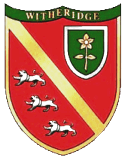

|
Discipline was very stern under the Rev. Benson. Youngsters who hoped to join the Choir became probationers and had to attend regularly at practice. However, until a place became vacant and they could move into a proper choir seat they did not qualify as members for choir privileges such as the annual outing. E.W. recalls her disappointment as a probationer at being told by Mr Benson "you're not in the choir and you're not going on the outing." Her mother took her in spite of this. For the outing, the Bensons provided a free lunch. The open horse-brake from Thomas's ("rivals" with Tidballs) used to take the party to Lapford Station to catch the train to Exeter and on to Exmouth. There was no cover to the horse-brake but "the summer was always fine and we never needed a cardigan in those days." Mr Thomas stabled his horses behind what was later to become Mr & Mrs Williams shop. Choir practice took place twice a week in church. As the shops did not close until 8 p.m. in those days, practice began at 8.15 p.m., and if you weren't there sharp, you got no mark. "For one practice, two big boys" brought up the harmonium from the bottom school; for the other, they used the organ. The player was blind Robert Hooper from the house beside the Angel now known as Paradise. Hooper was also a piano tuner and basket maker. He was a good musician and was taught new tunes by Mr Benson. Each choir seat was marked, and all the choir books were set out and numbered so that members collected their own as they came in. The Cathedral Choirmaster thought little of them on one occasion and is remembered as saying, "you might as well give them a cabbage leaf as music to read."
Choir suppers were well-disciplined affairs in the Vicarage, a list was made out of who was to take whom in to supper, each churchwarden was required to take in the wife of the other churchwarden. After supper, all went down to the schoolroom for music, and here each member of the choir was allowed to bring two guests. "Old Squire Cutcliffe" used to provide a Christmas tree. Sunday School took place at 10.15 and 2.15. In the morning the gospel and collect had to be learnt. Before 1914, the three Miss Cutcliffe ("Grace, Alice and Gertie") and Miss Partridge of Fern Cottage taught. After morning Sunday School they walked in twos in procession to church and sat at the back "under the tower." Before the sermon, however, they were allowed either to go out or to join their parents. There was a strict system of rewards; satisfactory attendance earned a white ticket and twelve white tickets made up a pink ticket and so many pink tickets earned a prize. In the afternoon Sunday School, Mr Benson himself used to appear and if you were called upon to repeat the collect learned in the morning and had forgotten it, you had to give your white ticket back. Then they again went in procession to church and Mr Benson quizzed them on the lesson. Previous Last Edited 03/07/2006 Copyright © 2000-2006 Witheridge Unless otherwise indicated on the page in question, the photographic images reproduced on this site belong to the Witheridge Archives, and, as such may not be reproduced for commercial purposes without written permission. However, you are welcome to use any of the photographs belonging to the archive for personal and/or non-commercial use. Any material shown as not being owned by the archive may not be reproduced in any form without first receiving written permission from the owner of the material in question. |


